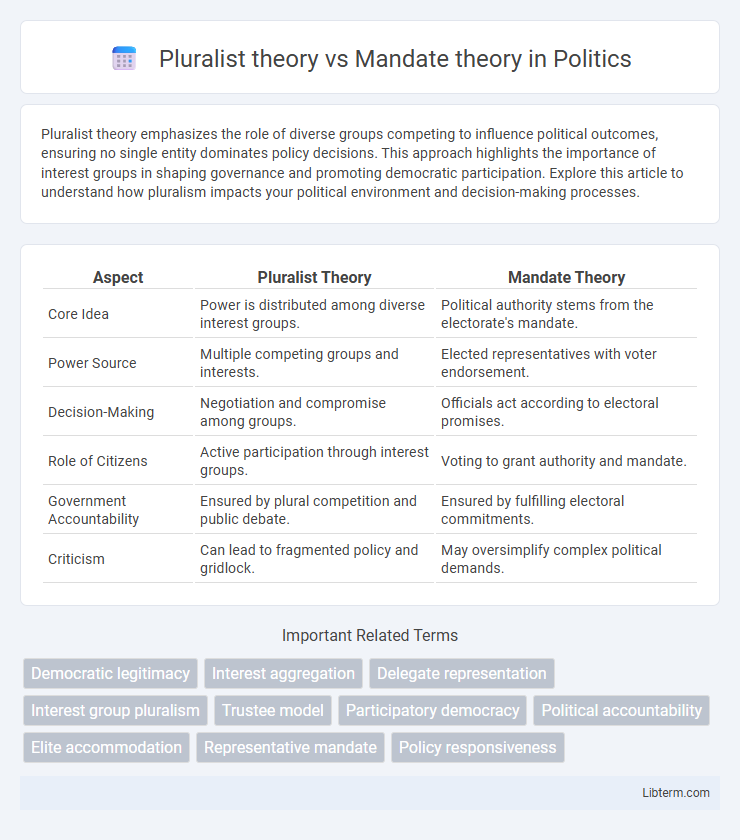Pluralist theory emphasizes the role of diverse groups competing to influence political outcomes, ensuring no single entity dominates policy decisions. This approach highlights the importance of interest groups in shaping governance and promoting democratic participation. Explore this article to understand how pluralism impacts your political environment and decision-making processes.
Table of Comparison
| Aspect | Pluralist Theory | Mandate Theory |
|---|---|---|
| Core Idea | Power is distributed among diverse interest groups. | Political authority stems from the electorate's mandate. |
| Power Source | Multiple competing groups and interests. | Elected representatives with voter endorsement. |
| Decision-Making | Negotiation and compromise among groups. | Officials act according to electoral promises. |
| Role of Citizens | Active participation through interest groups. | Voting to grant authority and mandate. |
| Government Accountability | Ensured by plural competition and public debate. | Ensured by fulfilling electoral commitments. |
| Criticism | Can lead to fragmented policy and gridlock. | May oversimplify complex political demands. |
Understanding Pluralist Theory: Core Concepts
Pluralist theory emphasizes the dispersion of power among diverse and competing interest groups in society, ensuring no single entity dominates political decision-making. It argues that democratic governance results from negotiation and compromise among multiple organized groups representing various segments of the population. This theory contrasts with mandate theory by highlighting decentralized influence rather than a singular, centralized political authority deriving legitimacy solely from electoral mandates.
Exploring Mandate Theory: Fundamental Principles
Mandate theory asserts that political authority is conferred upon leaders by the explicit or implicit consent of the governed, emphasizing the legitimacy derived from a popular mandate. It underscores that rulers must exercise power responsibly and are accountable to the electorate for implementing public policies reflecting the people's will. This theory contrasts with pluralist perspectives by centering on the direct authorization and trust invested in elected officials rather than the competition among diverse interest groups.
Historical Origins of Pluralist and Mandate Theories
Pluralist theory originated in early 20th-century political thought, emphasizing the distribution of power among diverse interest groups to prevent domination by any single entity, rooted in the works of theorists like Robert Dahl. Mandate theory, emerging from 19th-century constitutional and political traditions, centers on the concept that elected representatives possess a moral obligation to act according to the explicit instructions or mandates given by their electorate. The historical development of pluralist theory reflects a reactive stance against authoritarianism and centralized power, while mandate theory evolved from democratic principles emphasizing direct accountability and voter sovereignty.
Key Differences Between Pluralist and Mandate Perspectives
Pluralist theory emphasizes the distribution of power among diverse interest groups competing to influence political decisions, highlighting a decentralized and democratic process where no single entity dominates. Mandate theory asserts that elected officials hold authority because they have received direct approval from the electorate, prioritizing a clear, singular mandate to implement policies aligned with voter preferences. The key difference lies in pluralism's focus on multiple, competing sources of influence versus mandate theory's emphasis on electoral legitimacy and authority concentrated in government representatives.
The Role of Interest Groups in Pluralist Theory
Interest groups play a crucial role in Pluralist theory by representing diverse societal interests and influencing public policy through organized advocacy and lobbying efforts. This theory posits that power is distributed among multiple groups, preventing any single entity from dominating political processes. Interest groups serve as intermediaries between citizens and the government, ensuring that various viewpoints contribute to democratic decision-making.
The Significance of Elections in Mandate Theory
Elections in mandate theory serve as a crucial mechanism for translating voter preferences into authoritative political power, granting elected officials the legitimacy to implement their policy platforms. This theory emphasizes the direct link between electoral outcomes and governing mandates, contrasting with pluralist theory which views elections as one of many influences in a diverse polity. The significance of elections in mandate theory lies in their role in affirming the public's consent and guiding political accountability in democratic governance.
Practical Applications in Modern Democracies
Pluralist theory promotes diverse interest groups competing to influence policy, ensuring multiple voices shape democratic decision-making, while mandate theory emphasizes elected officials acting as direct representatives of voters' explicit mandates. In modern democracies, pluralist theory underpins lobbying, advocacy, and coalition-building, enabling decentralized power structures and responsiveness to varied societal needs. Mandate theory often guides electoral campaigns and legislative agendas, with politicians leveraging electoral promises as authoritative mandates to validate policy initiatives and governance legitimacy.
Strengths and Weaknesses of Pluralist Theory
Pluralist theory emphasizes diverse interest groups competing for influence, promoting democratic representation and preventing dominance by a single group, which strengthens political accountability and responsiveness. However, its weakness lies in the unequal resource distribution among groups, often leading to disproportionate influence by wealthy or organized interests and marginalizing less powerful voices. Critics also argue that pluralism underestimates elite power structures and can create policy gridlock due to conflicting group demands.
Strengths and Weaknesses of Mandate Theory
Mandate theory emphasizes that political leaders are representatives chosen by the electorate to execute their will, promoting democratic accountability and legitimacy in governance. However, its weaknesses include the oversimplification of voter preferences, the assumption of a homogenous electorate, and the potential neglect of minority interests and institutional checks. This theory sometimes underestimates the complexity of political power distribution, contrasting with pluralist theory's recognition of diverse and competing interest groups influencing policy outcomes.
Contemporary Debates: Which Theory Reflects Reality?
Contemporary debates between pluralist theory and mandate theory center on whether political representatives reflect diverse societal interests or act as direct agents of voter mandates. Empirical studies reveal mixed evidence: pluralist theory aligns with the influence of multiple organized groups shaping policy, while mandate theory underscores electoral promises guiding legislative behavior. The ongoing tension highlights complexities in representative democracy, where both group pluralism and electoral accountability coexist but vary across political systems.
Pluralist theory Infographic

 libterm.com
libterm.com